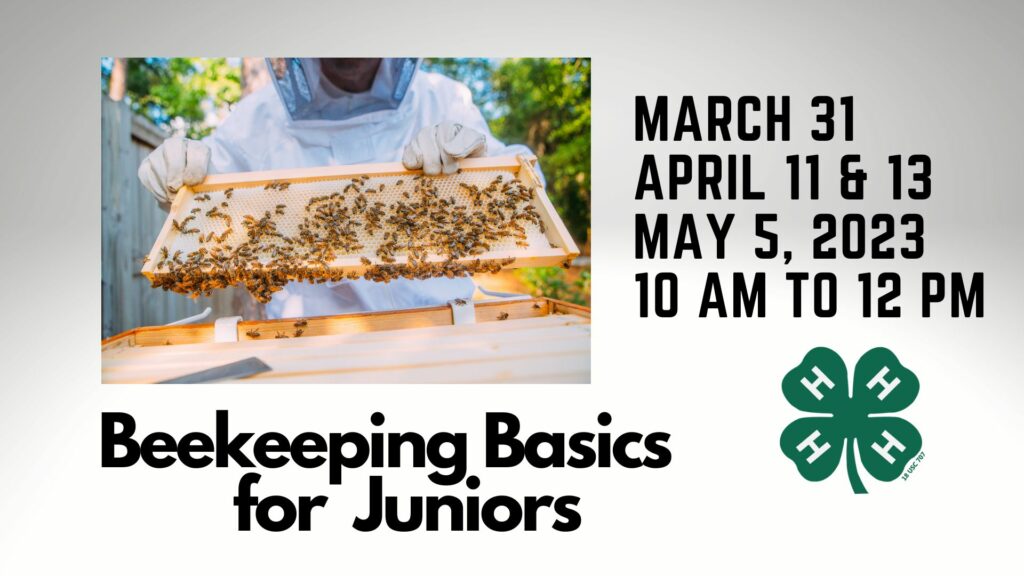Beekeeping Basics for Juniors
go.ncsu.edu/readext?924416
en Español / em Português
El inglés es el idioma de control de esta página. En la medida en que haya algún conflicto entre la traducción al inglés y la traducción, el inglés prevalece.
Al hacer clic en el enlace de traducción se activa un servicio de traducción gratuito para convertir la página al español. Al igual que con cualquier traducción por Internet, la conversión no es sensible al contexto y puede que no traduzca el texto en su significado original. NC State Extension no garantiza la exactitud del texto traducido. Por favor, tenga en cuenta que algunas aplicaciones y/o servicios pueden no funcionar como se espera cuando se traducen.
Português
Inglês é o idioma de controle desta página. Na medida que haja algum conflito entre o texto original em Inglês e a tradução, o Inglês prevalece.
Ao clicar no link de tradução, um serviço gratuito de tradução será ativado para converter a página para o Português. Como em qualquer tradução pela internet, a conversão não é sensivel ao contexto e pode não ocorrer a tradução para o significado orginal. O serviço de Extensão da Carolina do Norte (NC State Extension) não garante a exatidão do texto traduzido. Por favor, observe que algumas funções ou serviços podem não funcionar como esperado após a tradução.
English
English is the controlling language of this page. To the extent there is any conflict between the English text and the translation, English controls.
Clicking on the translation link activates a free translation service to convert the page to Spanish. As with any Internet translation, the conversion is not context-sensitive and may not translate the text to its original meaning. NC State Extension does not guarantee the accuracy of the translated text. Please note that some applications and/or services may not function as expected when translated.
Collapse ▲Have you ever wanted to learn about beekeeping? Well, here is a great opportunity to do just that. This four-part very hands-on program will let you experience the fascinating world of the honey bees. You will learn about their hives, sustainable beekeeping, life cycle of bees, products produced by a hive and install a new colony in their new home. Each session will focus on a different aspect of beekeeping while providing participants with hand-on experiences with bees, hives, and hive production.
This 4 part program for youth ages 11-18 is at the N.C. Cooperative Extension, Currituck County Center, 120 Community Way, Barco NC, 27917 on March 31, April 11, April 14 and May 5 from 10:00 a.m. to 12:00 p.m. We will be working with and around bees and their hives during all sessions and we will provide appropriate safety gear during the classes. Full enrollment in 4-HOnline is required for all participants. There is no cost for this program, but space is limited.
Register online with Eventbrite. After you complete your eventbrite registration, you will need to register your youth through the 4-H Online site. It is easy and only takes a few minutes. Please call us at (252) 232-2261 and we will guide you through the process if you have any problems.
After signing up, be sure to check out more learning opportunities offered by N.C. Cooperative Extension in Currituck by visiting our website at currituck.ces.ncsu.edu.
For more information or if you need accommodations for persons with disabilities please contact Sherry Fischlschweiger at (252) 232-2262 or by email at slfischl@ncsu.edu no later than 10 business days before the program date.
4-H is North Carolina’s largest youth development organization, equipping more than 263,000 young people each year with the skills to succeed and improve the world around them. 4-H programs and camps encourage young people to “learn by doing,” helping them to develop into active, contributing citizens. NC State Extension and the Cooperative Extension Program at N.C. A&T State University coordinate 4-H programs statewide. 




